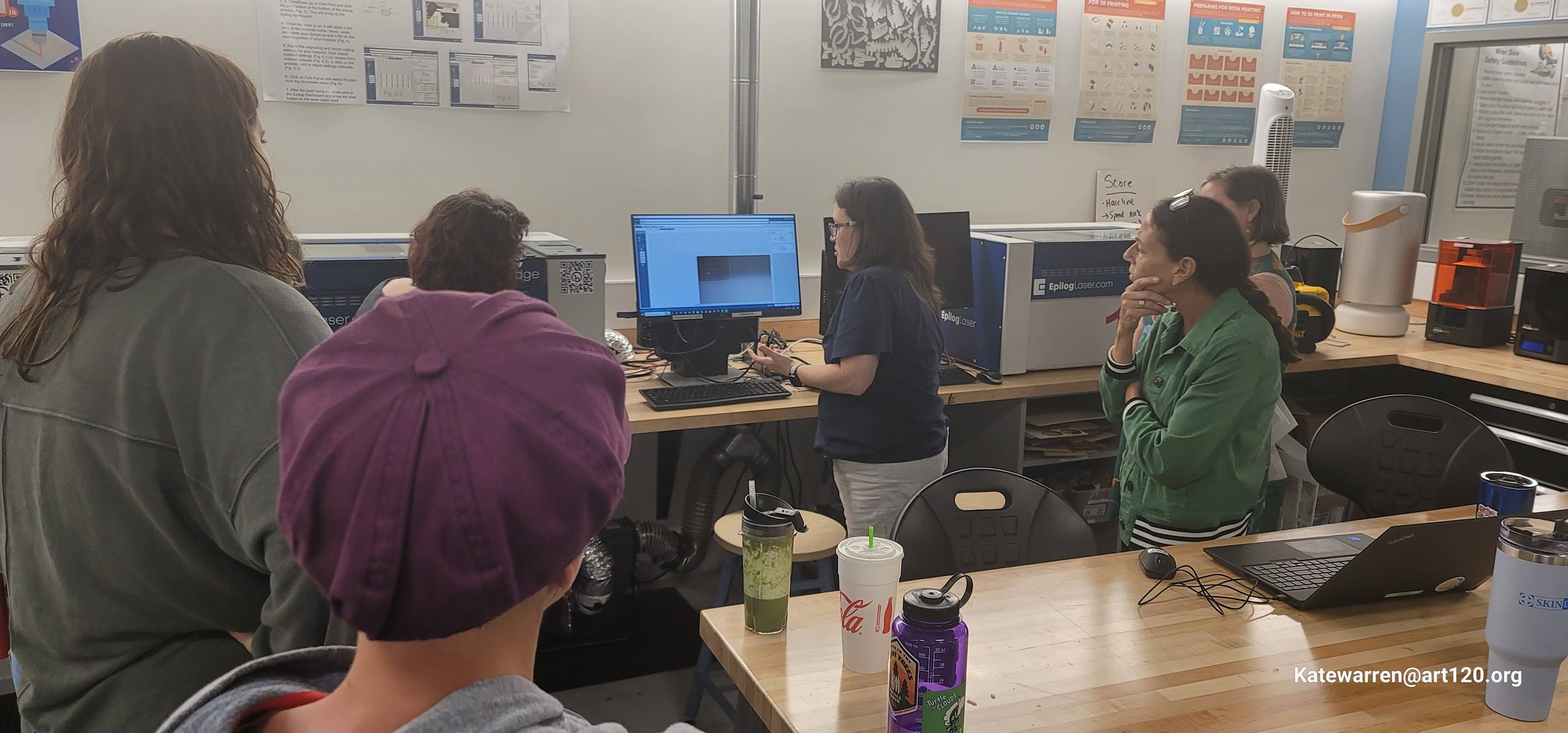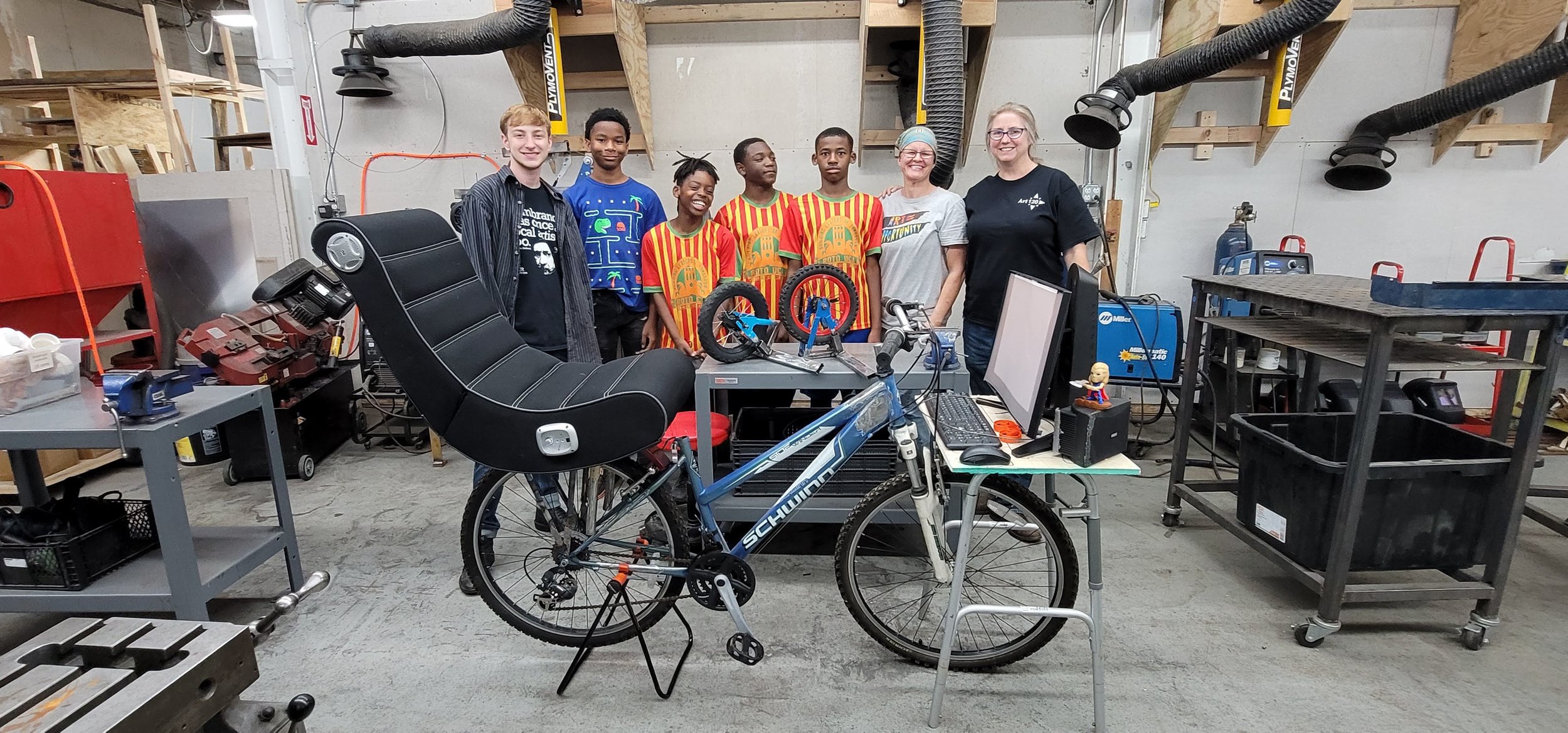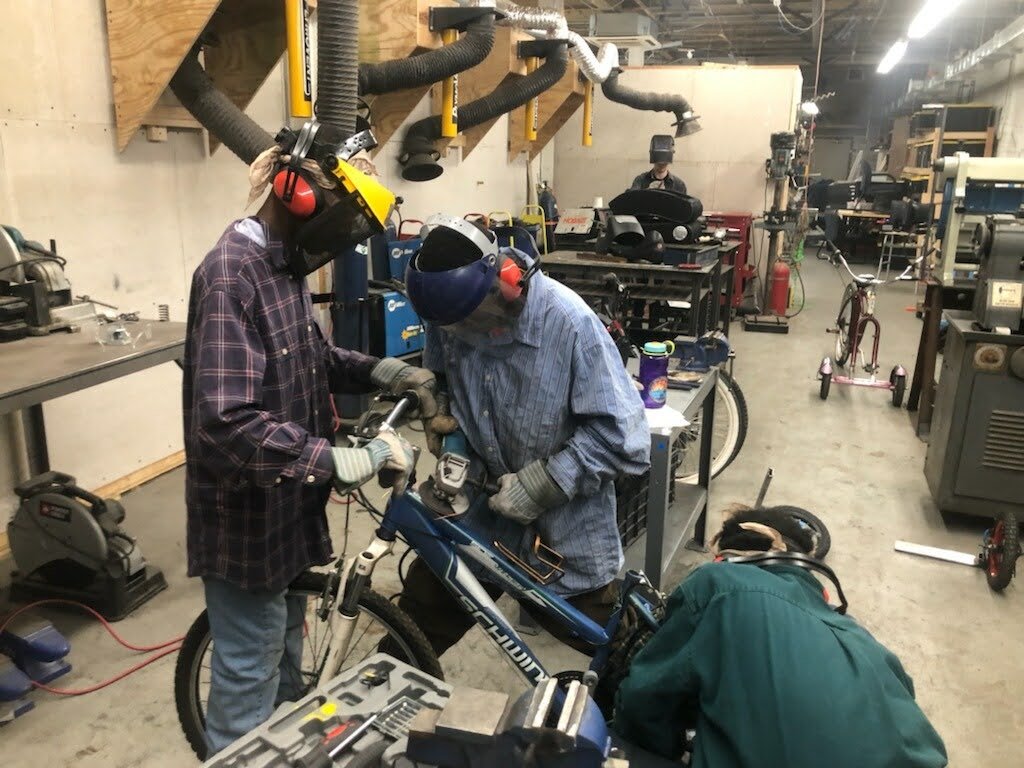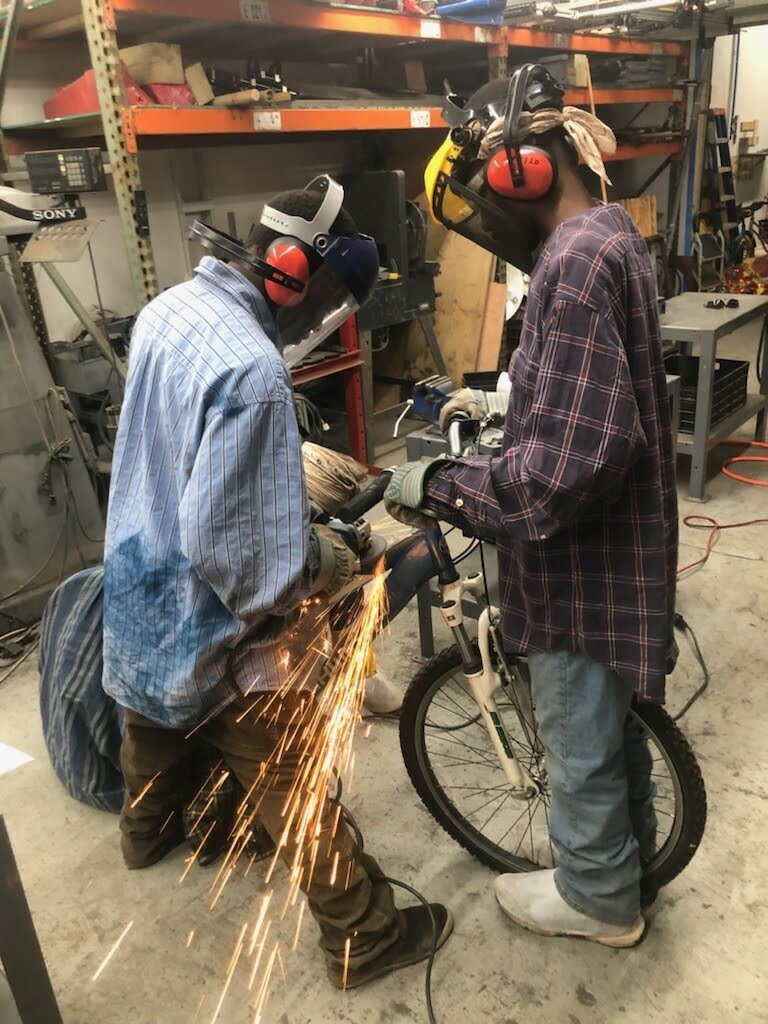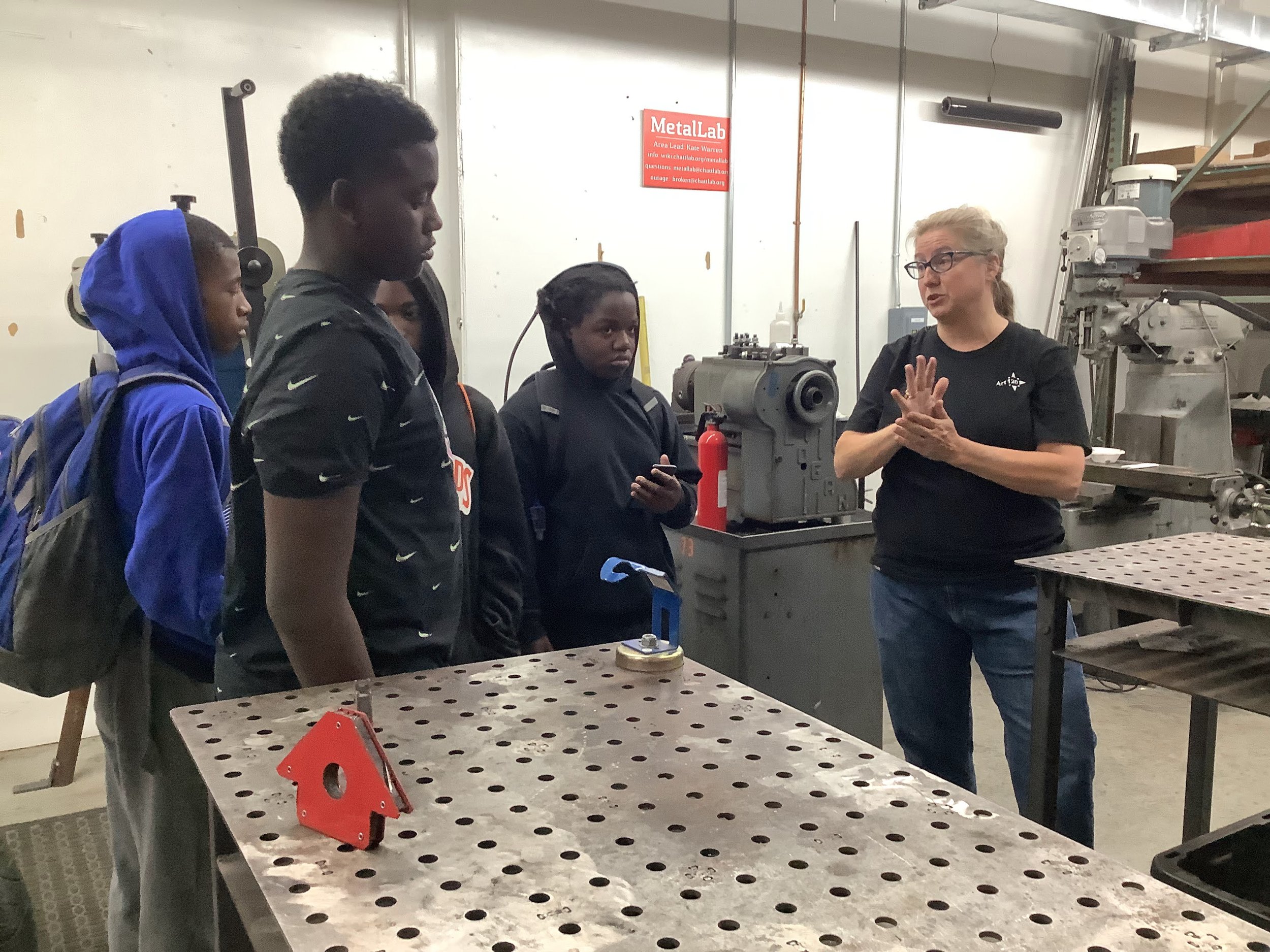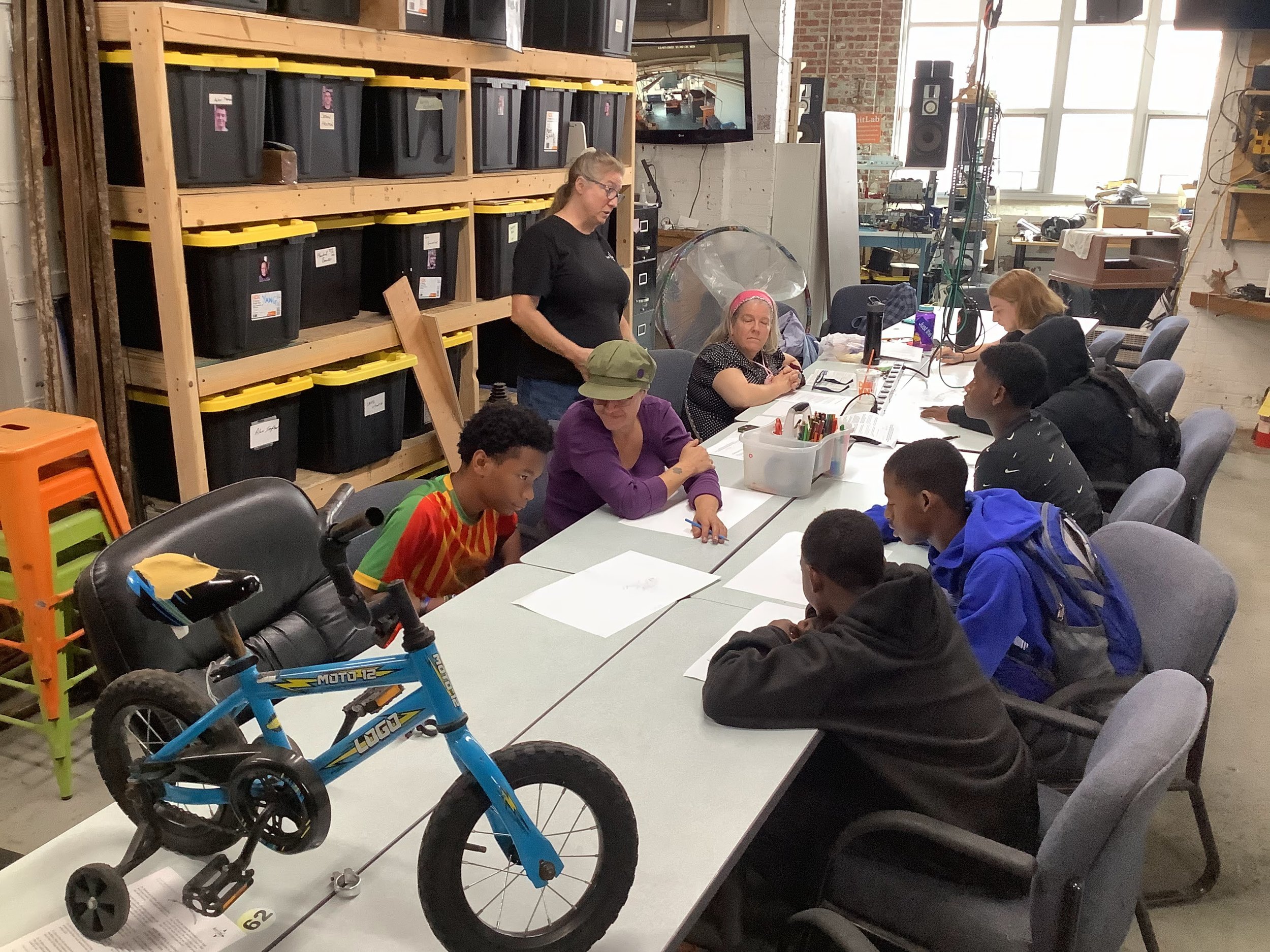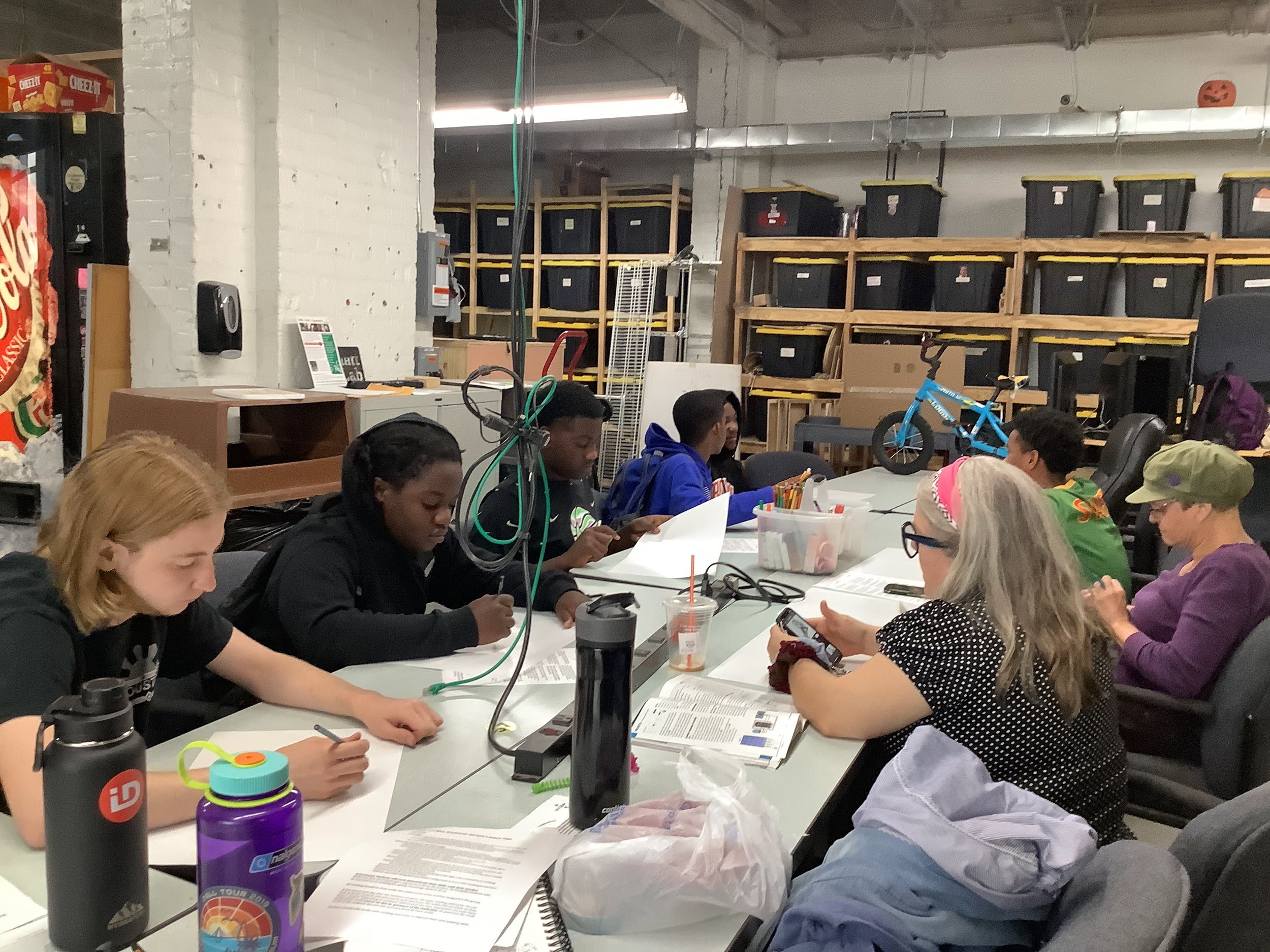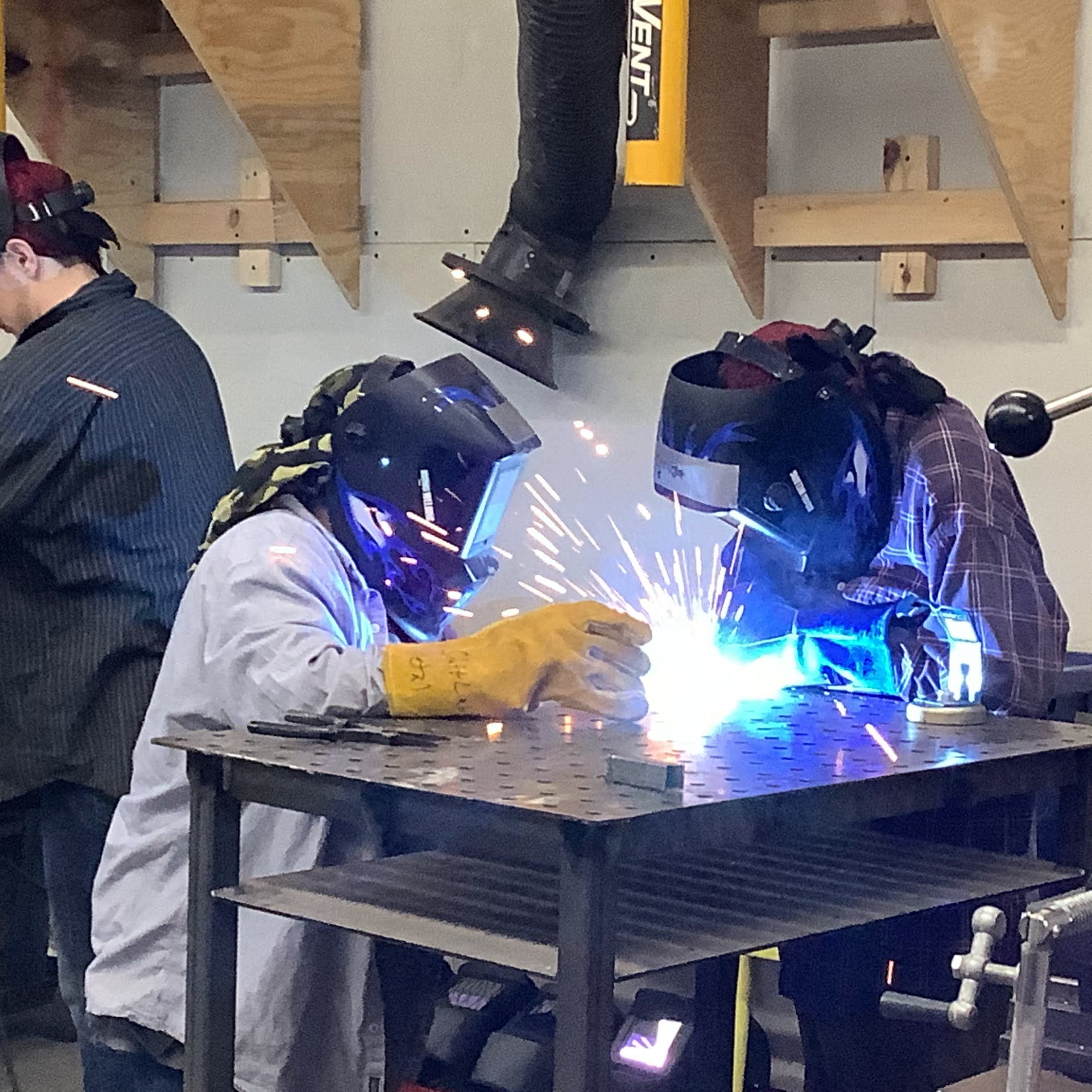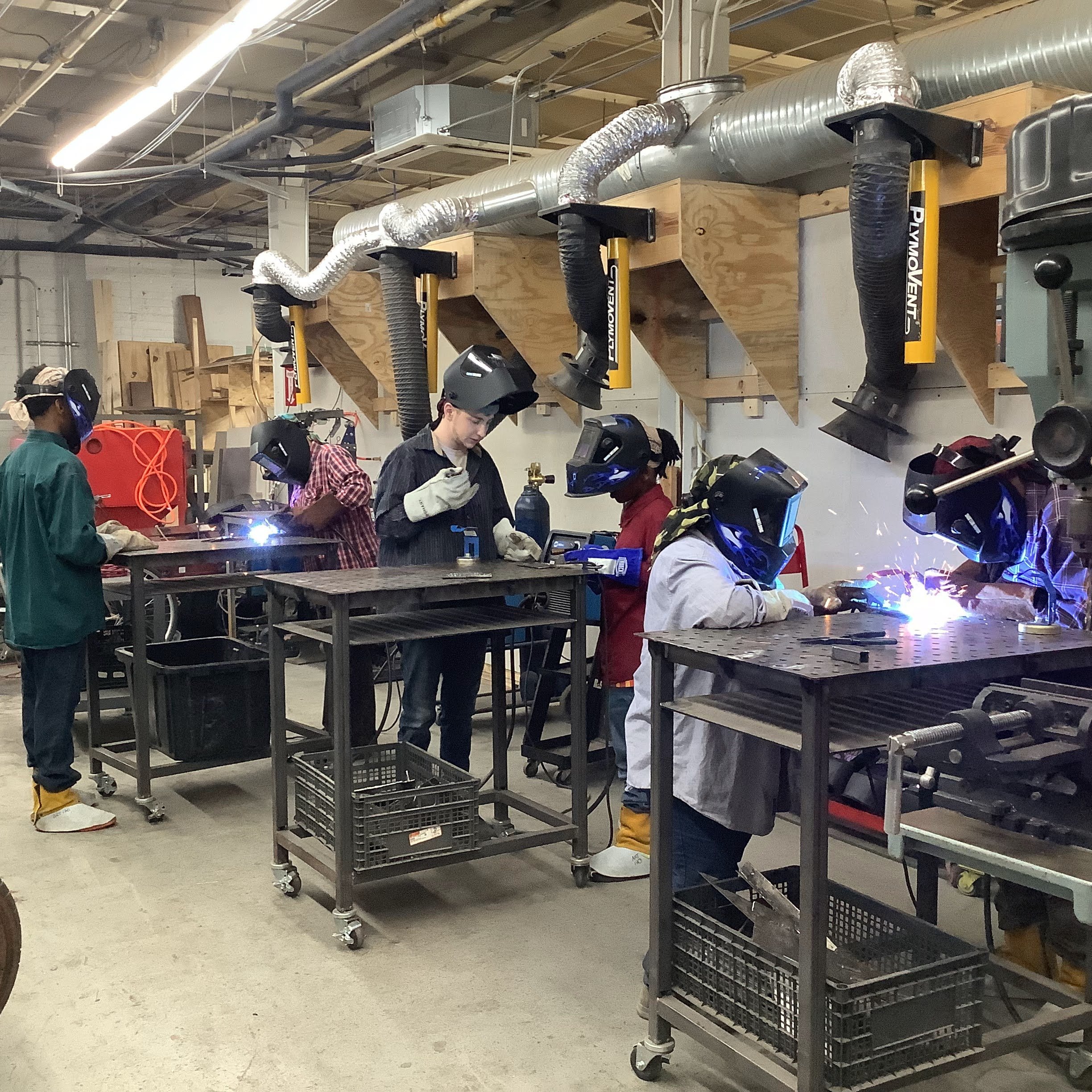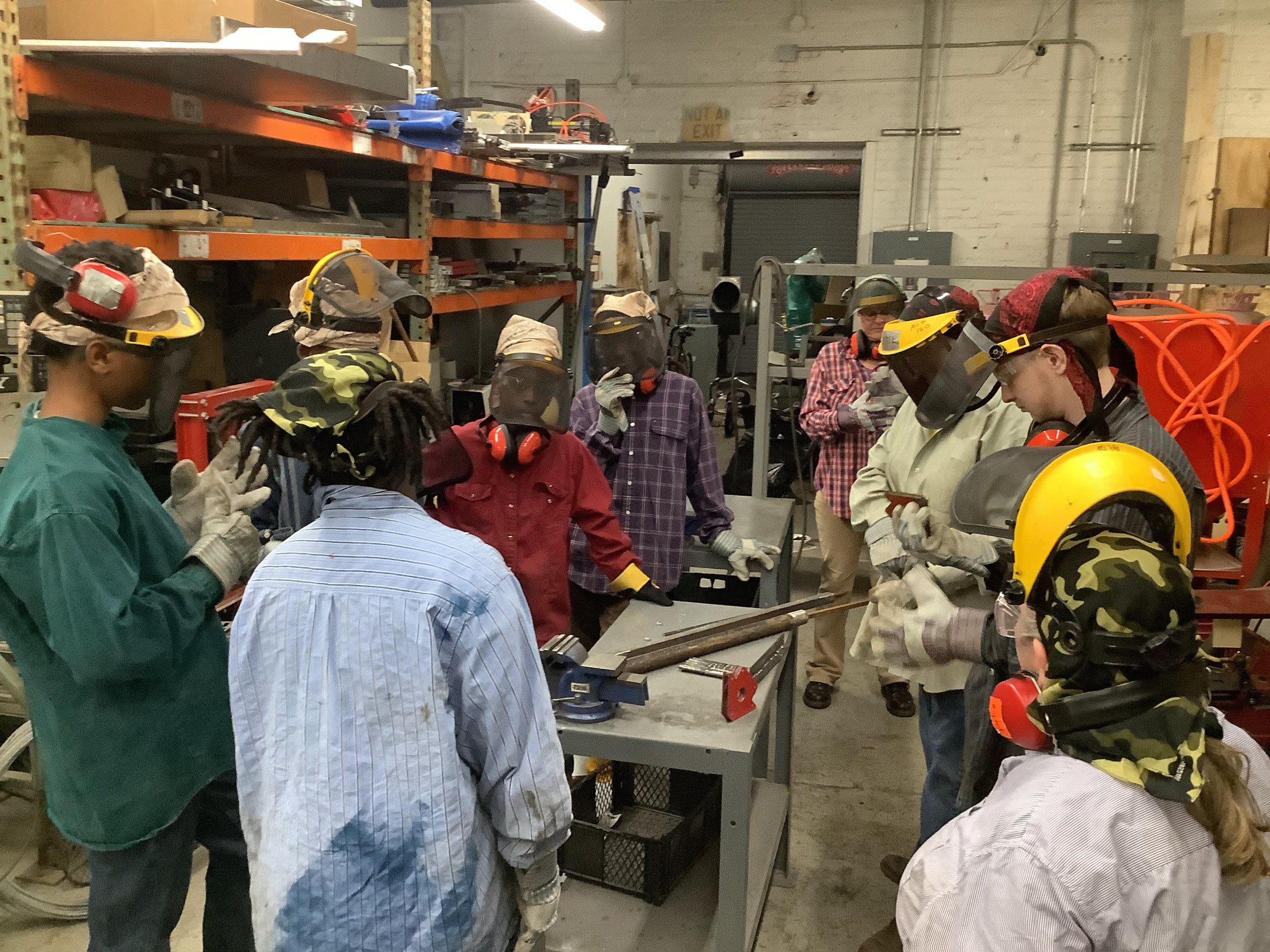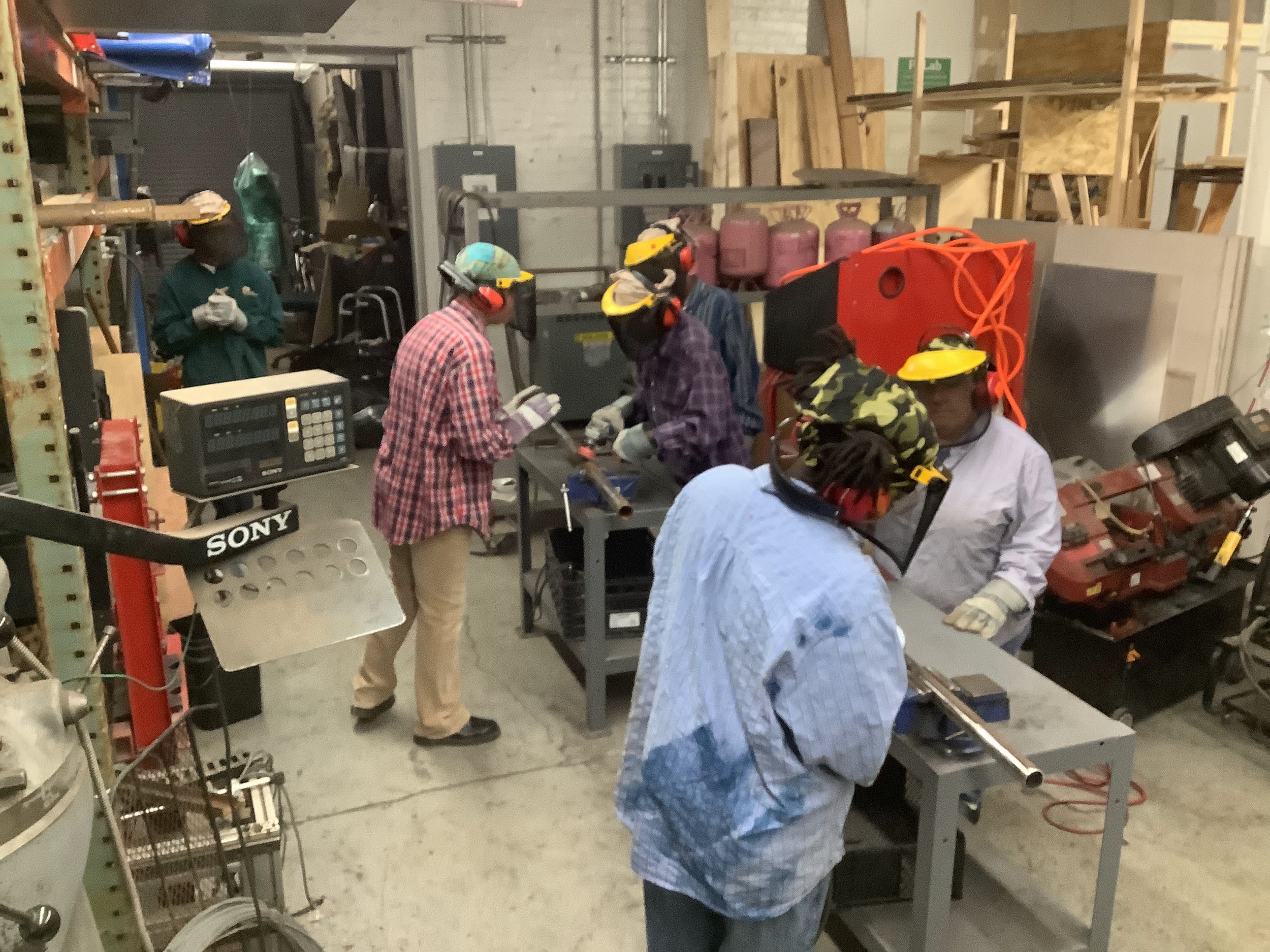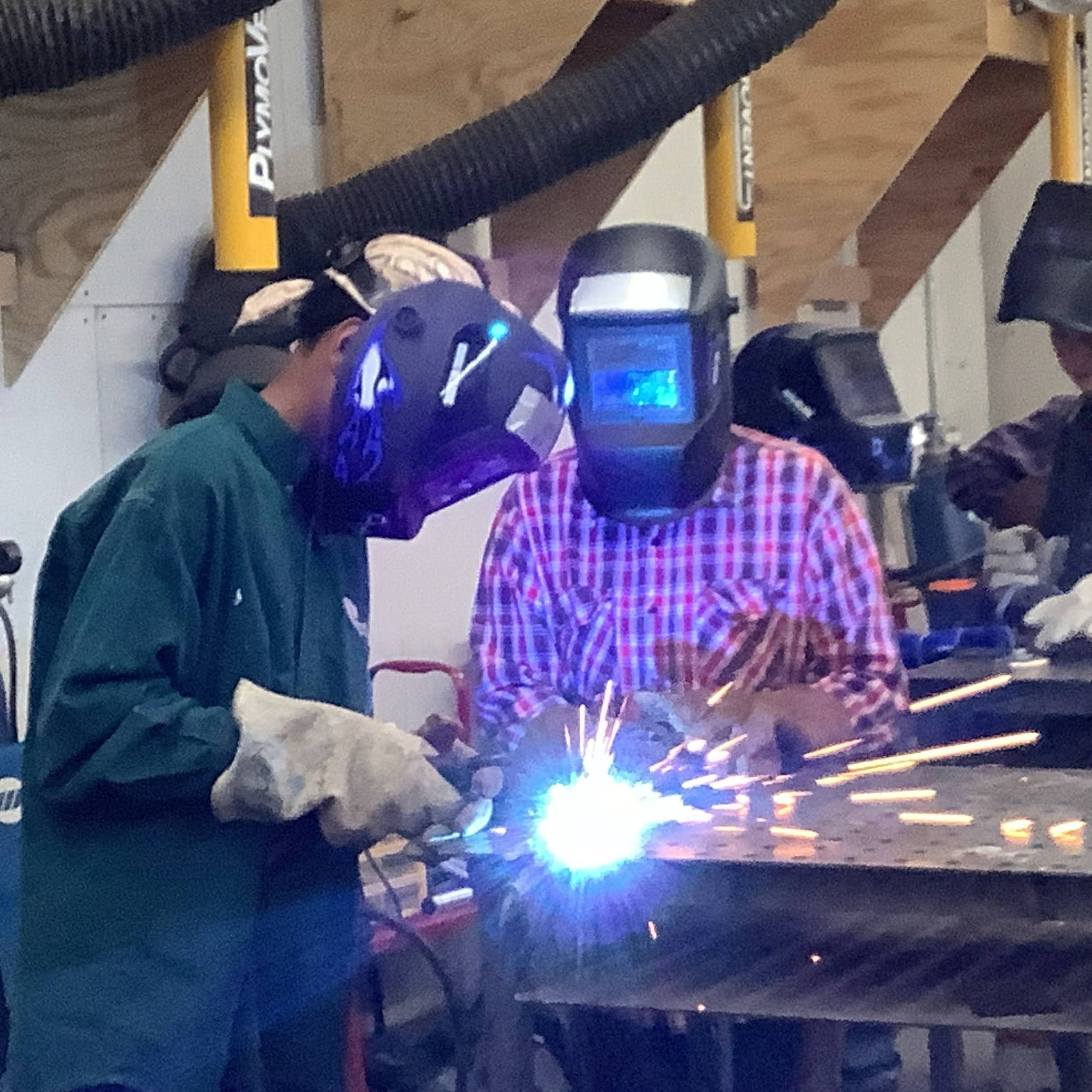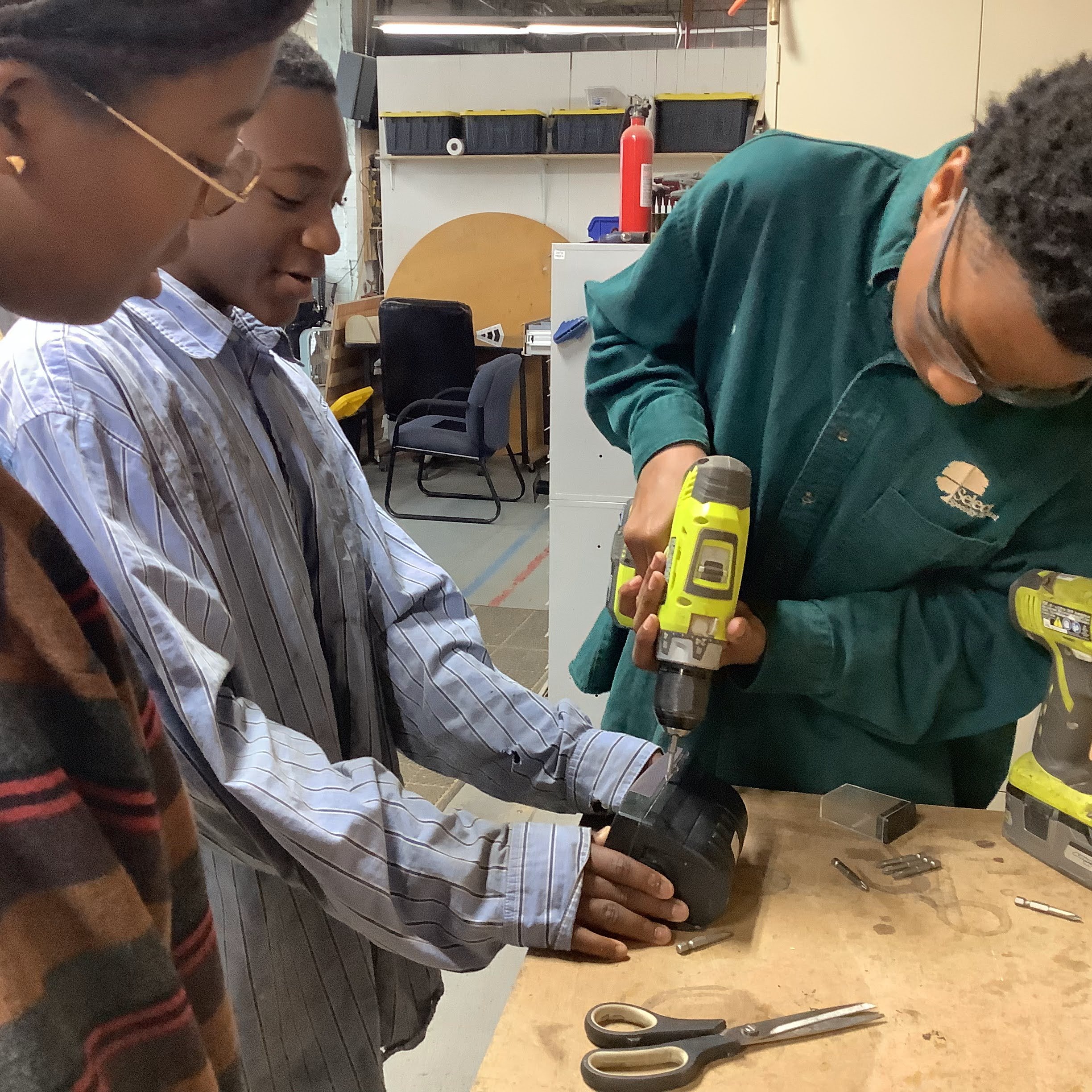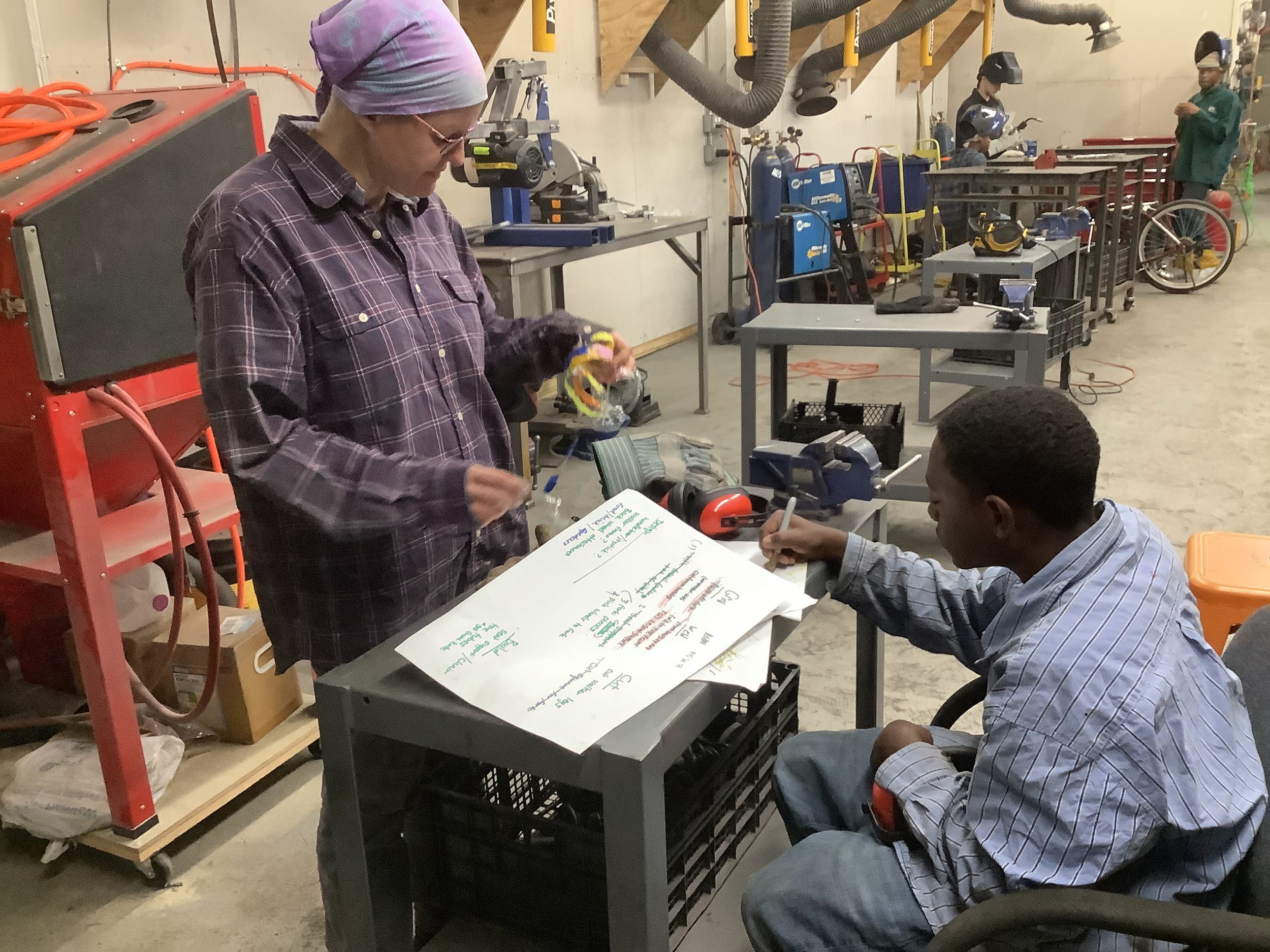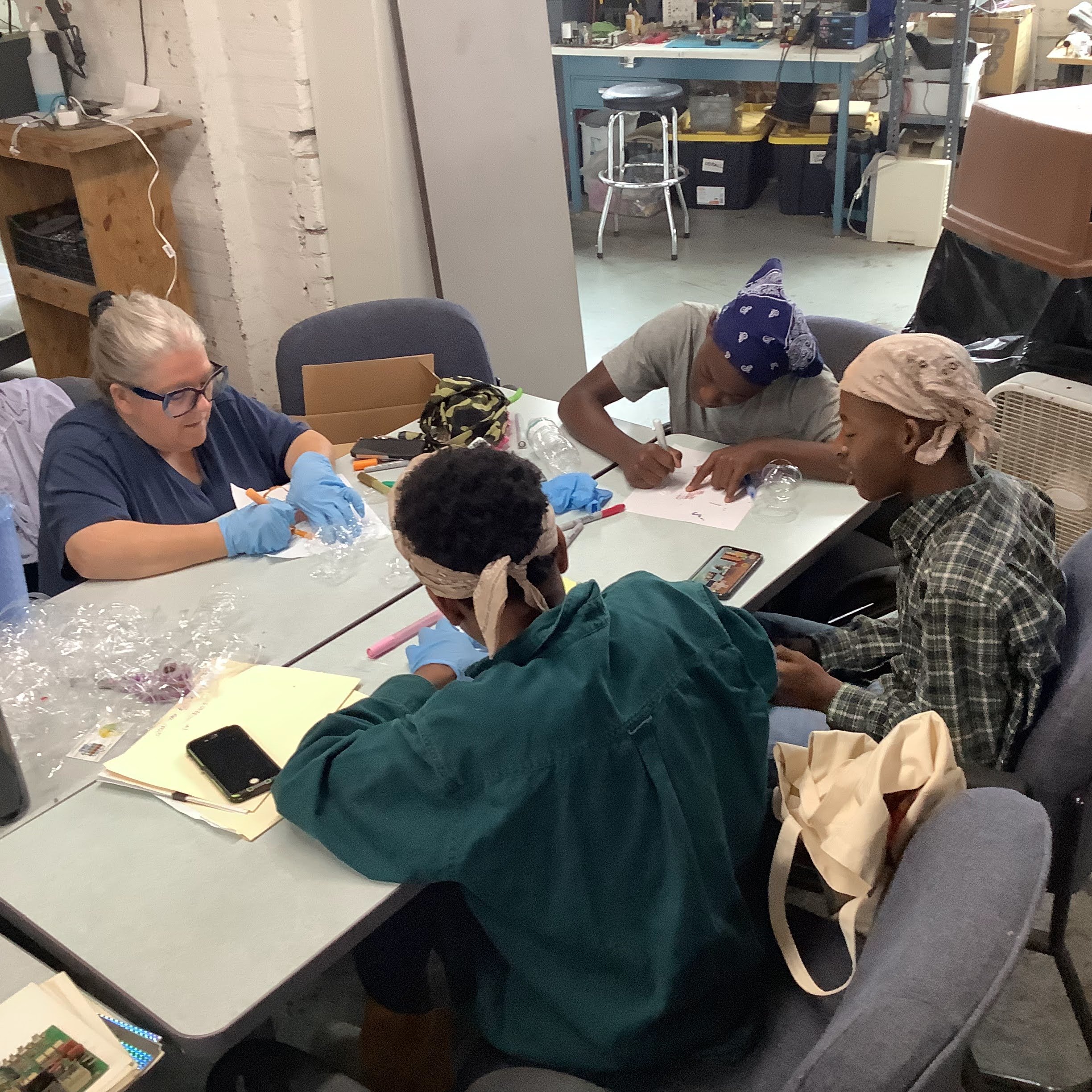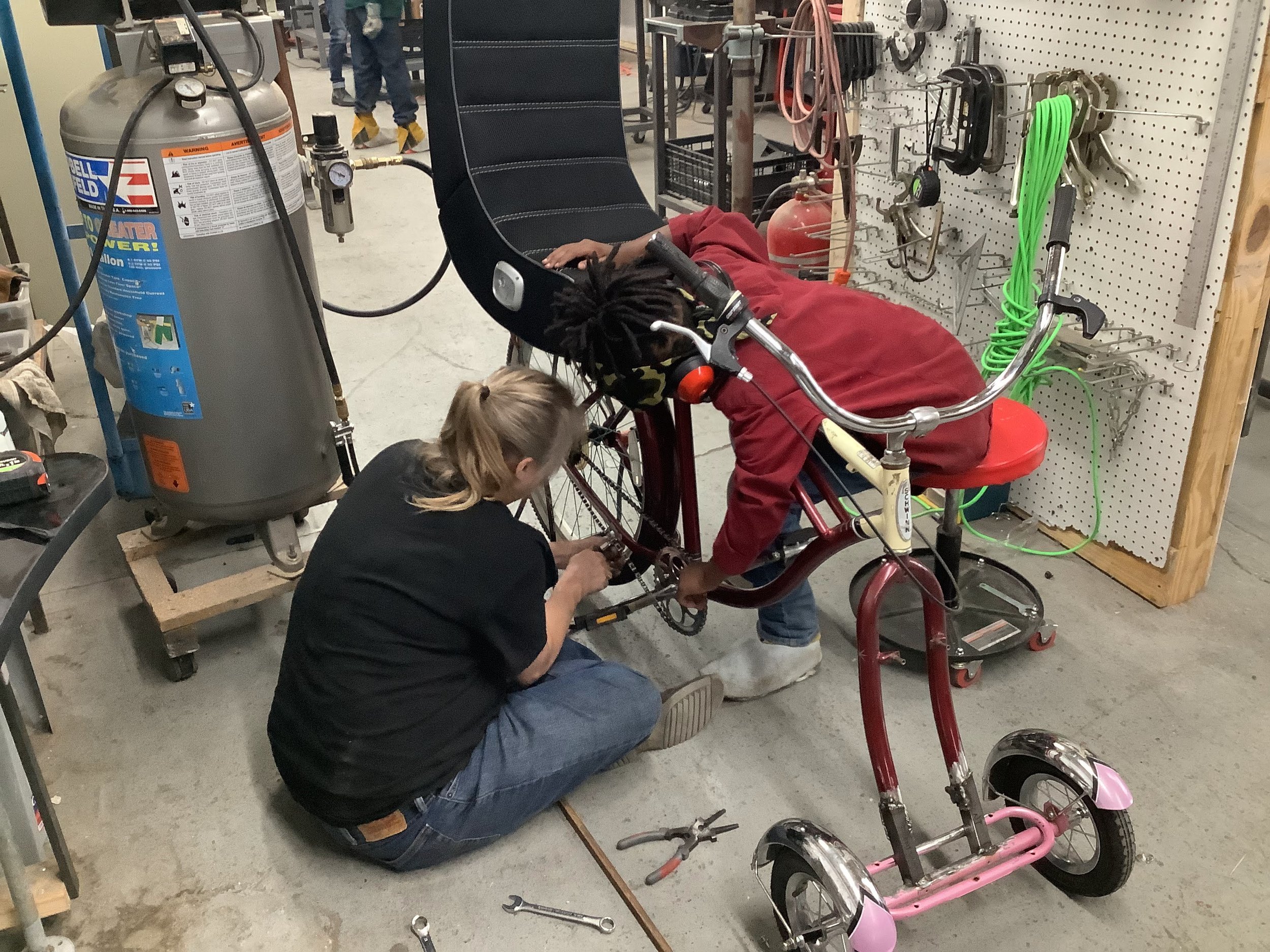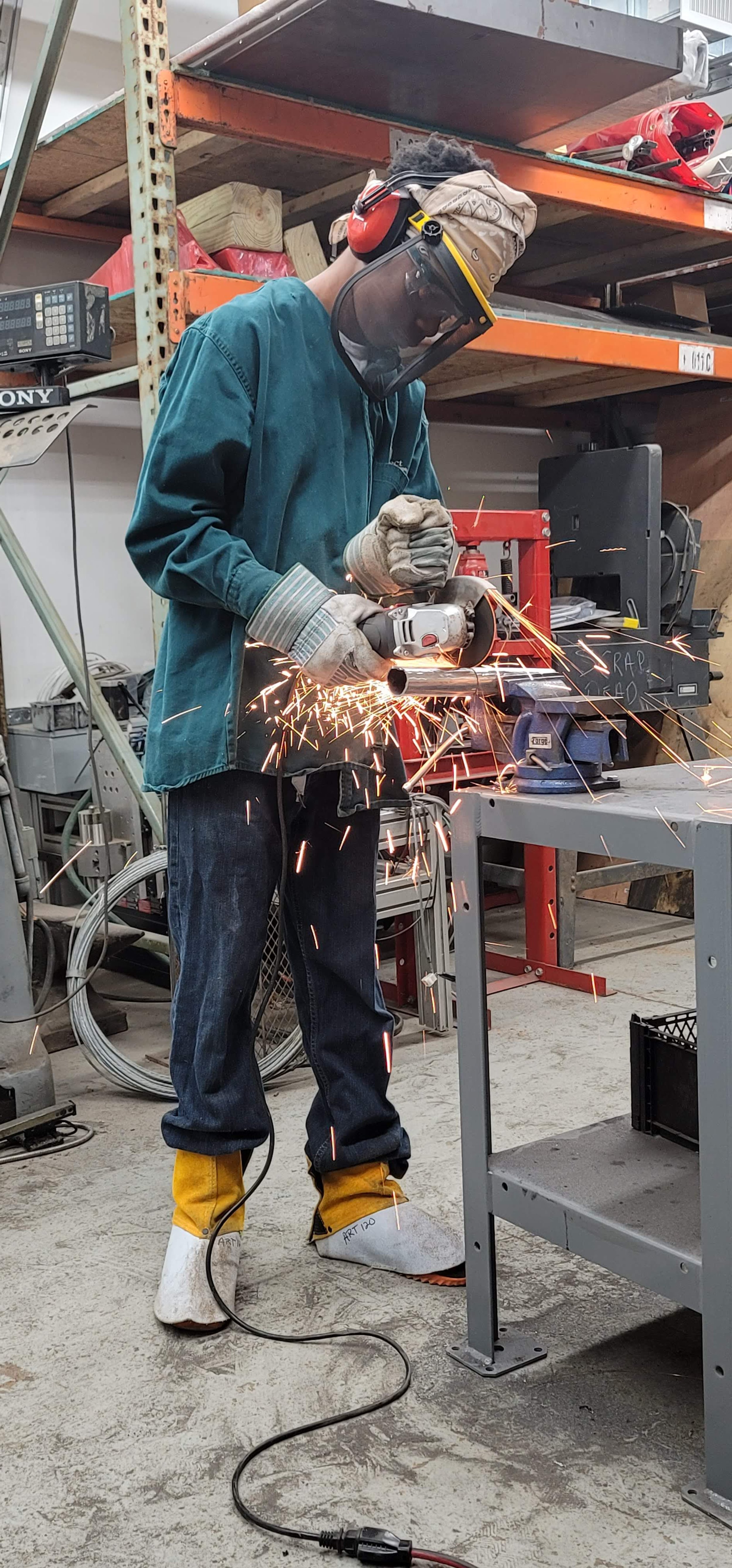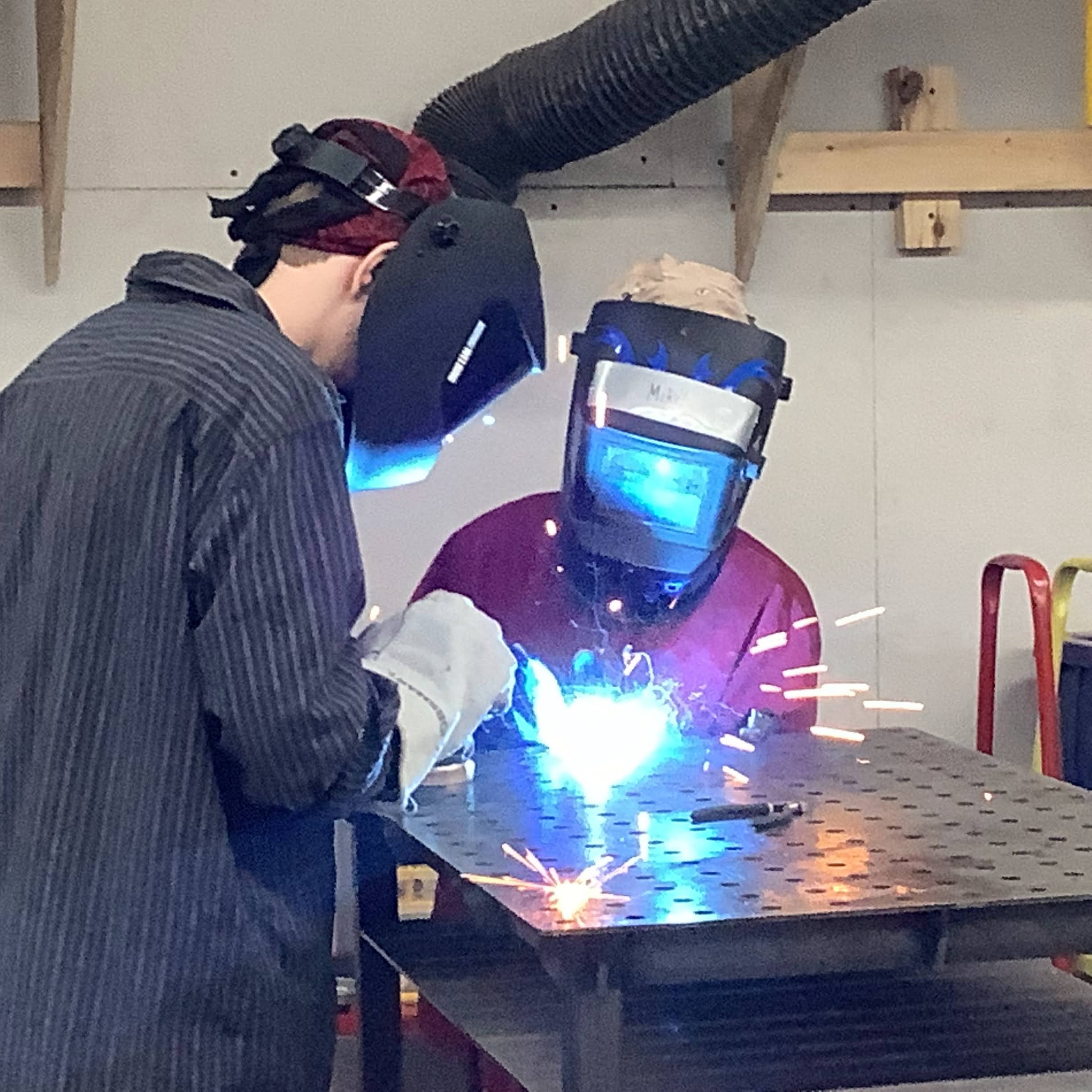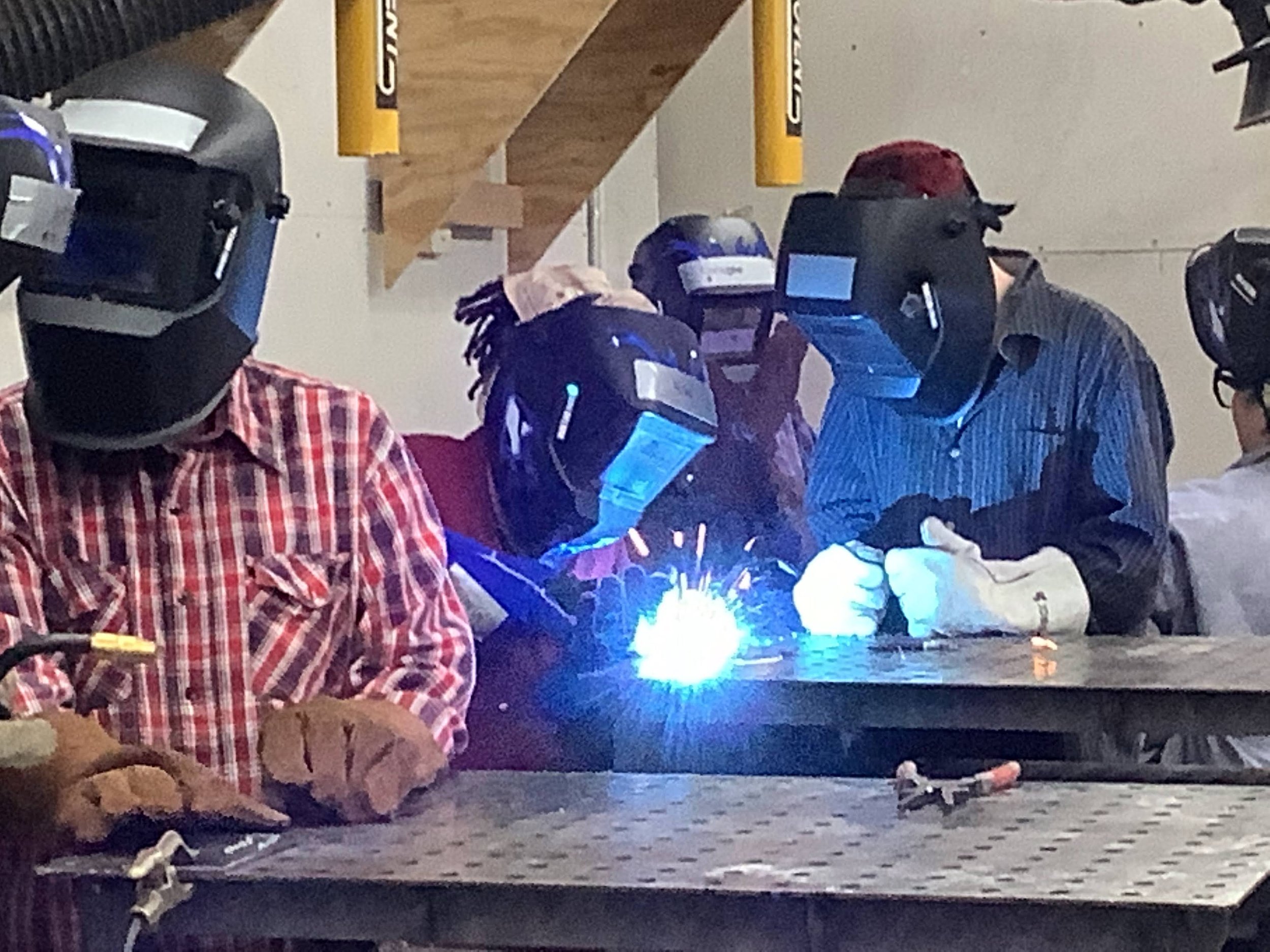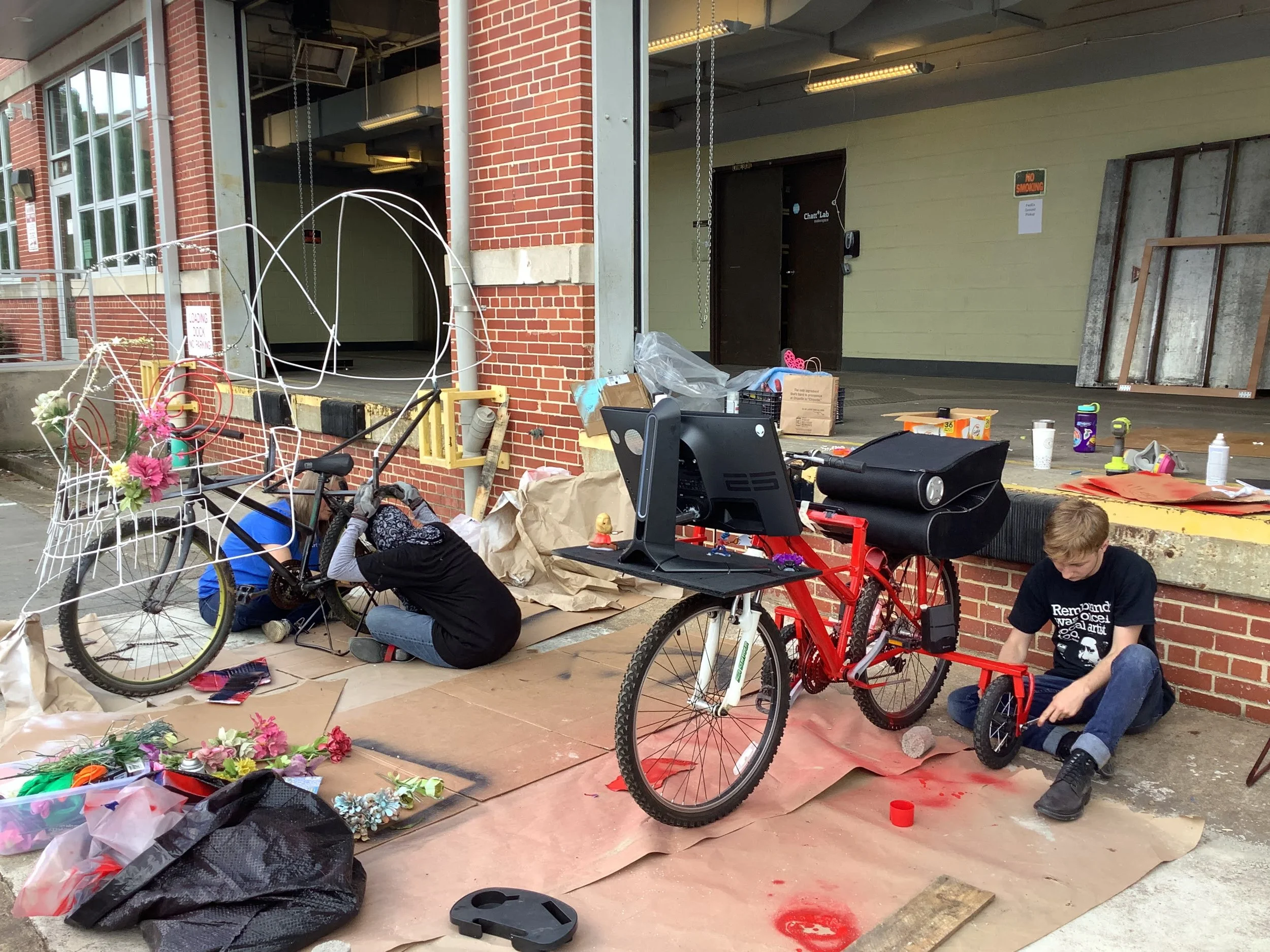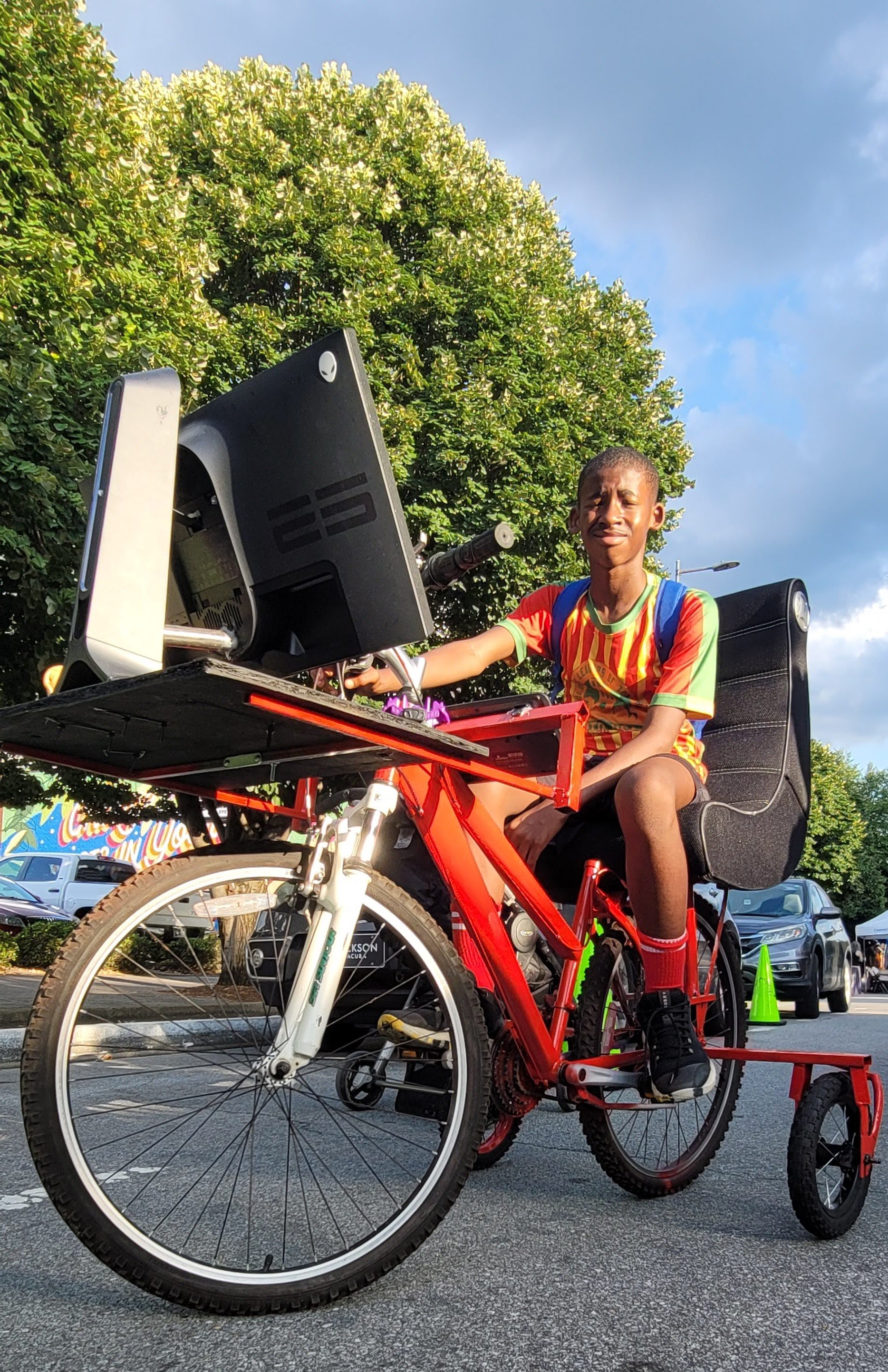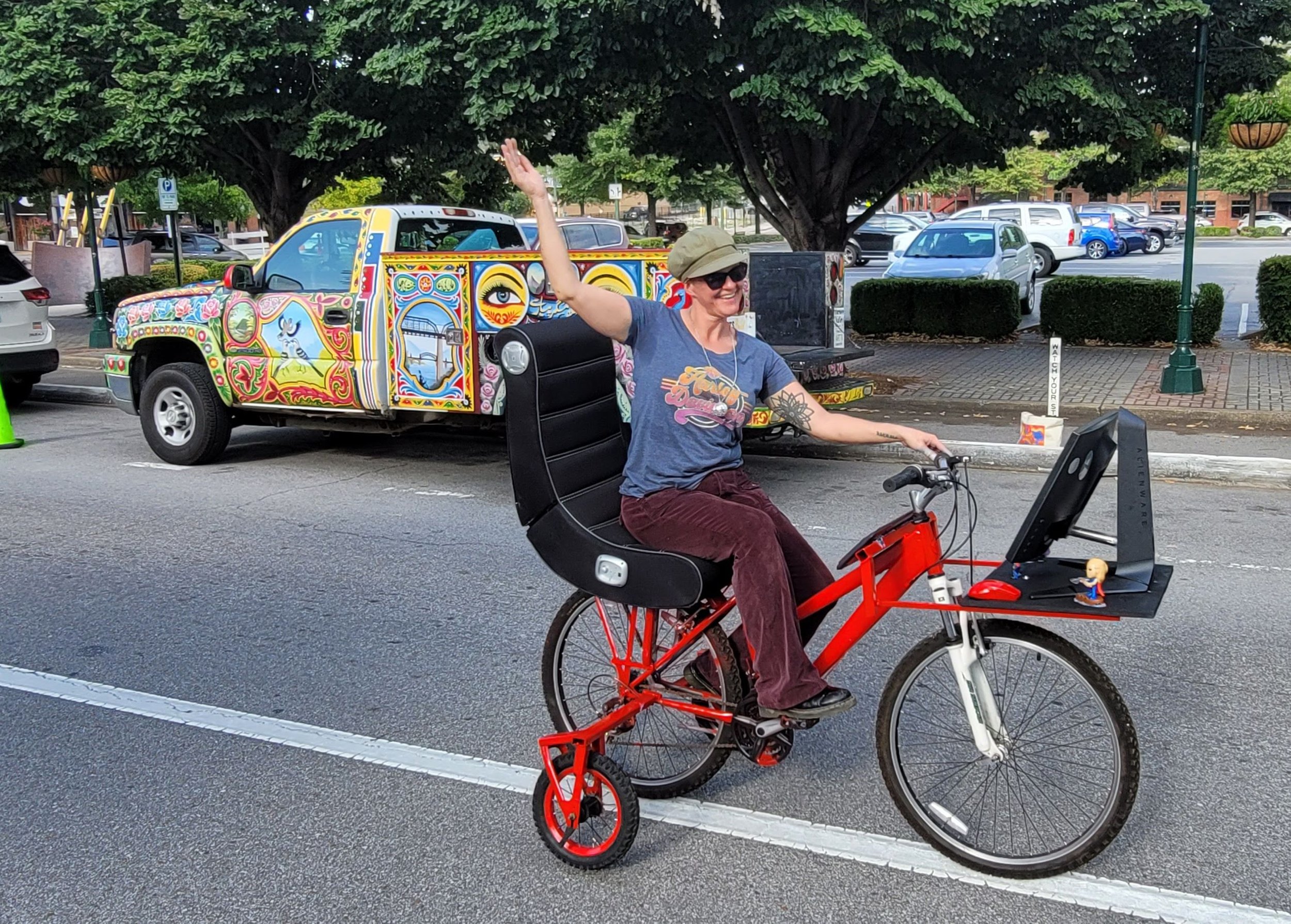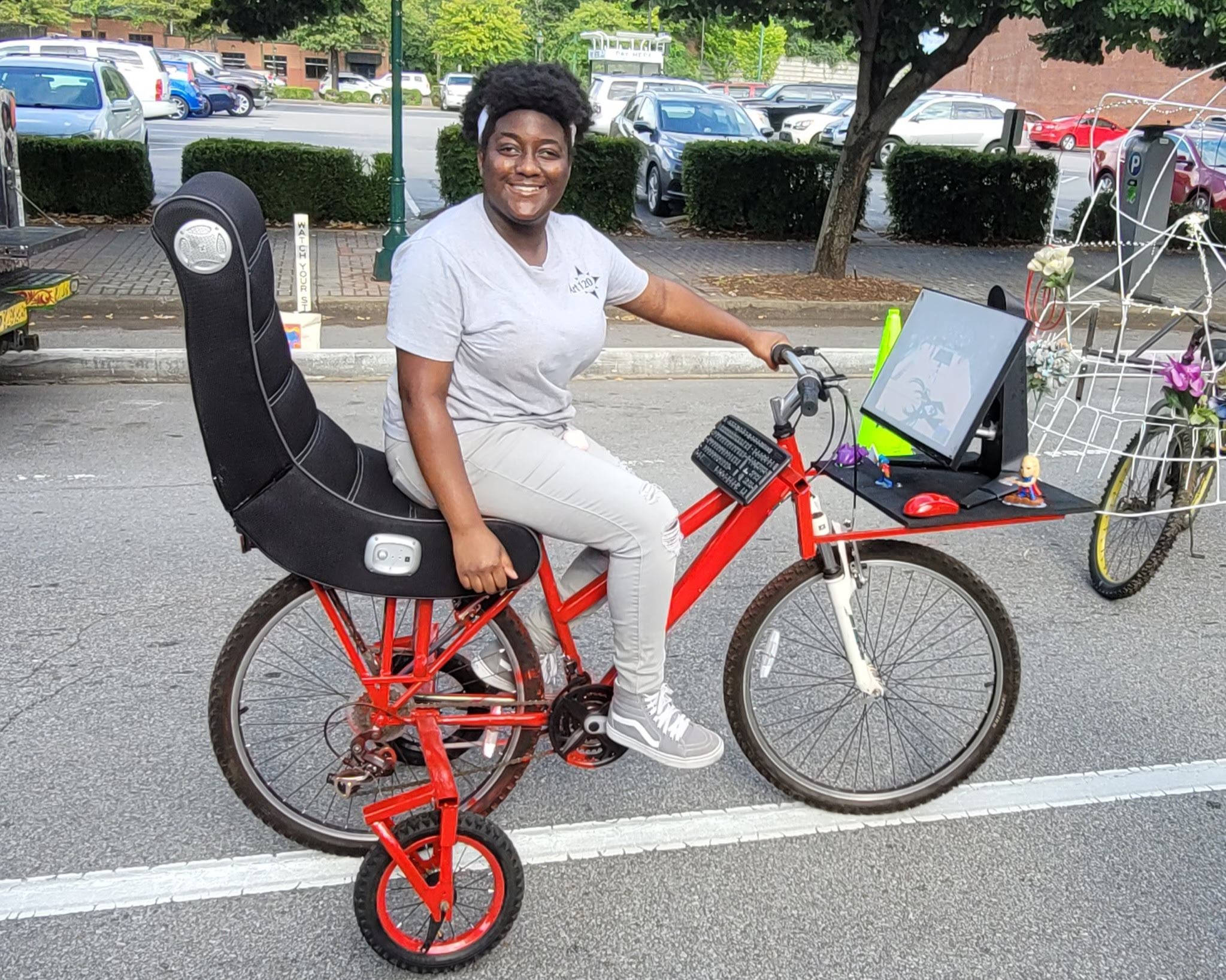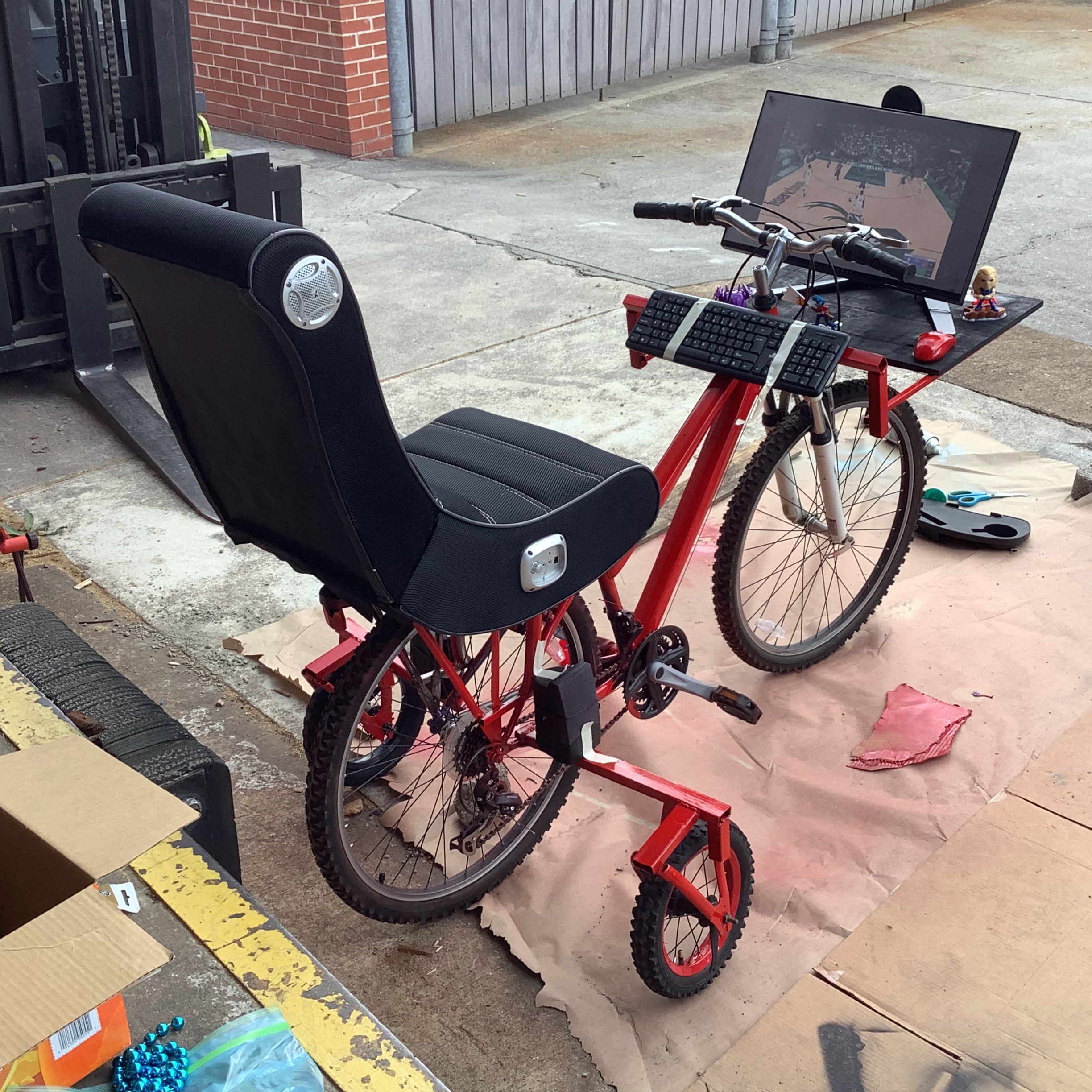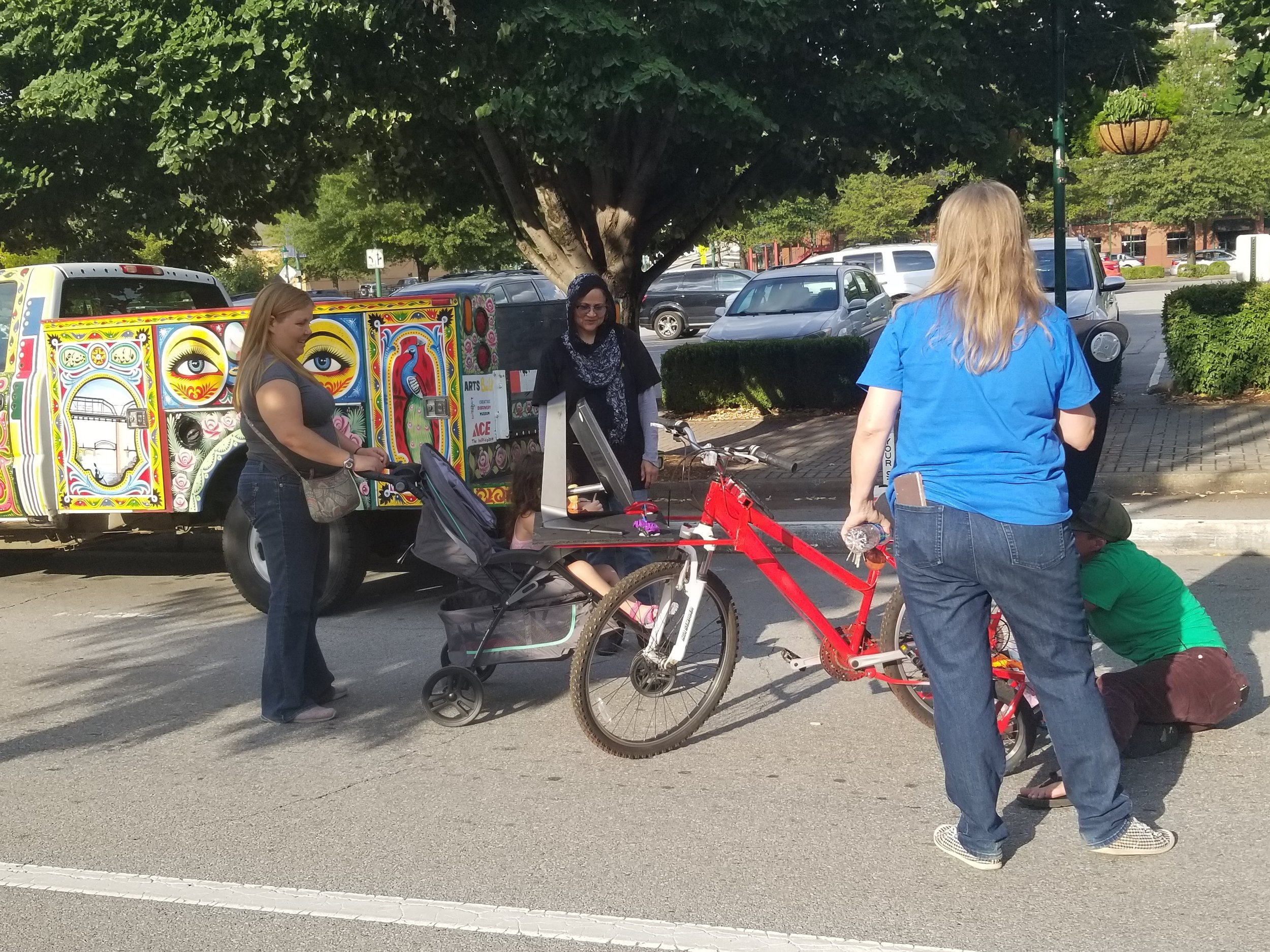
2024 Art Education Teacher Training
Example of digital art mafr by teachers during workshops.
By DeAsia Powell
Instuctors begin Teacher Training workshop with a general introduction
Program Objectives
After discovering the void of knowledge Hamilton County students and art teachers have on computer aided design/computer aided manufacturing (CAD/CAM), Art120 began this year’s Art Education Teacher Training Workshops with the initiative of spreading exposure and education on such resources to art teachers of Hamilton County. Two separate workshops took place for nine teachers. By the end of each workshop, teachers were confident with acquired knowledge and ready to incorporate it into their curriculum in preparatory and hands-on activities in schools and the greater community.
Course Operation Tactics
Practical education is the use of the most common computer design program used in schools; and in this year’s workshop, instructors based the classes off of a two-folded digital art program called, “CorelDRAW”. In order to effectively relay such a fresh concept to teachers, workshop Instructors took a step-by-step approach by beginning classes with a: “Tell, Show, Do, Review” introductory presentation, followed by an on-screen group presentation, and ending with one-on-one work with the art educators. Given many options were unknown to participants, specific emphasis was placed on readily available and economic options given the limited resources art educators have. To accommodate the limited resources available to educators, Art 120 selected CorelDRAW, affordable and alternative design programs like Adobe Photoshop, Adobe Illustrate, and Canva were also introduced to allow teachers to familiarize themselves with a variety of production options at little expense. Every teacher had immediate access to a variety of resources and was lended a laptop or tablet with CorelDRAW installed on it if needed to ensure full participation and engagement. They were also presented with a wide variety of material that can be engraved, cut, scored, or generally manipulated by computer aided design or manufacturing.
Challenges
Instructor works one-on-one with Woodmore art teacher Robin Jaglinski
One major necessity of working with educators in workshops is knowing how to overcome challenges that may arise while serving professionals with a wide range of knowledge. This year, a main obstacle was working with the general lack of familiarity art teachers had with computer-based art design, and the range of previous knowledge and experience in this field. This yielded groups consisting of a mixture of those who were unfamiliar with computer design, to former professional graphic designers. To combat this, course instruction began with teaching the basics, then solely touched on taking the actions necessary for meeting the goal of every teacher leaving with a complete physical piece of artwork relevant to their school activities. This approach balanced the engagement of those who were familiar with the program CorelDRAW and those who needed more assistance. This proved to be beneficial to the overall learning experience, as teachers began assisting each other through the process which fortified their knowledge. . Furthermore, by limiting the shared screen lecture presentations and emphasizing hands-on learning, and problem solving, the majority of concerns or questions were resolved.
The next hurdle that we faced is dealing with the timeframe of when the workshops can take place. Because they are often pushed till the end of the school year, this minimizes the number of students the school visits impact. However, with more funding for school visits, this outcome will be improved by FY 2025
Another one of the major takeaways observed from these workshops was that teachers were so unaware of these possibilities available to them in contemporary manifestations of CAD/CAM in STEAM education, that they were amazed once they discovered how they can utilize and incorporate these programs into their curriculum. Presumably, in educational programming for art education, implementation of these resources are presumed complete once infrastructure and machinery was installed, so Art120’s next crucial tasks are ensuring future improved access and training with these resources.
Outcomes
Example of digital art teachers worked on
This year's workshop yielded many successful results, and will continue to grow its potential outreach to schools and the greater community. These workshops met the goal of enabling teachers to acquire knowledge on digital art and leave with a physical object relevant to their school’s activities. Before the workshop, more than 50% had little to no knowledge on how to use drawing programs and 70% had little to no knowledge on digital laser cutters. After the workshop, every teacher confidently knew how to prepare artwork on a computer program for output and produce it on a variety of materials including paper, wood, and acrylic. This new work will be implemented in the upcoming fall potentially impacting 4,469 students county wide. Outreach is guaranteed to succeed best in the primary grades as seven out of eight schools represented were elementary schools.
As this program was recognized on a county level, we plan to share our data with Nation of Makers and Maker Ed to make our program accessible for any art teacher interested. With Support from multiple grants, we were able to continue this program and attract the eye of Lyndhurst Foundation and earn their support in helping grow this program over the next two years.
Salutations
As we embark on another successful path to increase the exposure of art resources in our greater community and schools, we will strive to recruit passionate makers and community leaders to ensure our Hamilton County teachers and students have access to 21st Century learning opportunities.
Special thanks to Kristin Burrus, The Global Center of Digital Innovation, The Tennessee Arts Commission and The Lyndhurst Foundation for making this workshop possible.
2022 “Urban Art Bike” Summer Workshop (Cont.)
By DeAsia Powell,
Communications Assistant Intern
Introduction
In this year’s Urban Artbike Workshop with local youth organization, Reach One Teach One, boys between the ages of 10 - 15 constructed a “Gaming Station” themed bike in under forty hours. Over the course of ten days, Chistian Phillips created the team name, “Walanda Forever”; and Woodmoore Art Teacher, Robbin Jaglinski, and Industrial design intern of University of Houston, Ivan Warren, assisted the boys in using their teamwork skills and various engineering methods as they faced obstacles along the way!
Participants
Of Reach One Teach One, Christopher Small, Keon Franklin, Christian Phillips, and Mikel Fueget - Grayson and their “Gaming Station Bike”.
Mikel Fueget - Grayson
Mikel Fueget-Grayson is an 11 year old from Chattanooga, TN. He joined Urban Art Bike to try something new, and wanted to leave with knowledge of putting bikes together! In Mikel’s free time he loves playing video games, and aspires to be a Police officer when he grows up!
Christopher Small
Small, a 12 year-old sixth grader from Chattanooga joined Urban Art Bike wanting to have fun and make something new. In his free time he plays basketball and video games. Christopher says, “I will destroy anyone who comes for me in Call of Duty–it’s the only game I play!” When he grows up, he wants to be an NBA player
Keon Franklin
Franklin is also from Chattanooga, TN. He joined Urban Art Bike at age 13 because he was looking for fun and wanted to acquire new building skills. Keon is energetic, and plays games in his free time. He wants to be a police officer or engage in some type of law enforcement when he grows up
Christian Phillips
Christian Phillips, of Denver, is 14 years old. He joined Urban Art Bike because it sounded interesting and he wanted to learn how to change bike tires. In his free time Christian likes to skateboard. He also likes to solve puzzles saying “I can solve a Rubik's cube in 10 seconds!” He aspires to be a marine and engineer when he grows up.
Day 5 - 7: Instruction Days
Throughout the first three days of the workshop, the kids were instructed on: use of equipment, safety protocols, and given a tour of ChattLab Makerspace! In the maker space, they were introduced to complex equipment such as 3D printers, a wood shop, a metal shop, a laser cutter, and more. They also were taught how to weld and grind metal in preparation for making their art bike using scraps of metal! During the brainstorming process; Ms. Robbin’s “Wakanda Forever” team came up with a “gaming station” bike; It would be decked with an old gaming console, controllers, speakers, placed on an old desk or piece of wood at the front of the bike!
Days 8 - 14: Construction, assembling, and Finalizing
The team worked efficiently, tearing bikes apart for their design, welding those parts on new bikes, grinding away paint, and welding new metal to create new structures for their design! One day, after reevaluating their bike, they found out that in order to implement the gaming design on any bike, they would need a “quadra - bike” or regular bike with two extra back wheels to support the weight in the back. Sort of like training wheels.
Acquired New Skills
In some situations, the boys learned professionalism skills and the experience of a business-like environment! For example: when the bike construction began, the boys were tasked with calling around to repair shops, resale shops, and electronic stores–like Best Buy–in search of an old console! The team scripted and rehearsed their professional conversation before contacting potential providers. Ms. Jaglinski says, “You have to sell the program, tell them what’s going on and what we’re asking for! And be respectful when you’re talking to other companies!”
The art bike boys map out possible new bike design
Team and students plan new engineering methods together.
Another scenario enforced teamwork and innovative methods! When the workshop team were down to their last days, they began splitting into teams to be more efficient with their time. Ivan’s team would weld parts to the frame of the bike; while Ms. Robin’s team would prepare and grind possible new parts for the bike. The few boys who weren’t in the workshop worked on the actual “gaming desk”; they were drilling holes into the old speakers, replacing wood for the desktop so it would withstand the weight of gaming objects, and working together to figure out how to attach the computer, mouse, keyboard, etc. to the desk efficiently.
Faced Challenges Along the Way!
Throughout the construction process, plans and bike construction were switched multiple times. First, the team switched bikes on Day 8 and took it apart to figure out placement of design, and went to work!
Then, In the final days of actually assembling the bike, the team overcame obstacles such as struggling to get the picture for the “gaming screen” that would be on the computer and having to switch bikes on the last day. As executive director Late Warren Mikel worked on replacing the bike chain, they discovered the main frame wouldn’t support the seat and back tires; because the frame wasn’t steel and wouldn’t support the overall design! So, they quickly collected a steel bike with a sustainable chain and began welding their back tire assembly, gaming chair, and front desk onto it!
The Impact - from a students’ Perspective!
In a quick interview, Christian Phillips explains his experience at the “Urban Artbike” Program and how it has impacted him
AND THE FINALE….. CYCLEDELIC!!!!
CycleDelic is an annual downtown Chattanooga bike parade that celebrates During the parade riders and creators roller skate and ride bikes down Brad’s street and show off all their authenticity and art to the sound of the best summer hits!
Art120 Team decorates and spray paints Art Bilee’s hours before event!
Art 120 and their team finalized all construction and decoration on two art bikes (“Skull Bike”, and “game bike”) for the parade that night!
During the parade, the art bikes were exhibited and causally driven up and down the street; as visitors and fellow riders applauded the students’ creativity! One of the students, Christopher Smalls, showed up with his parents, representing the “Reach One Teach One” program!
In conclusion, the Urban Art Bike workshop was a total success and left a positive impact on our kids. You can look forward to seeing them in public events around Chattanooga such as Mainx24.
Special Thanks to….
Thanks to the people and organizations of: Reach One Teach One, and The Tennessee Arts Commission,
